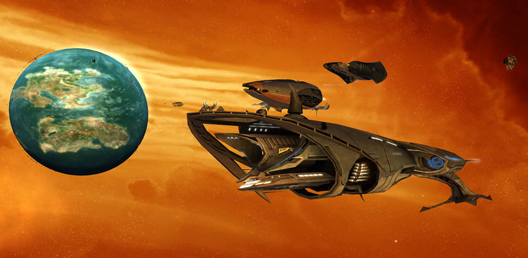Recently Sins of a Solar Empire (known as 'Sins' where I have read it before) was on sale in Steam. It contained all sequels for a reduced price, and was in the top three sales when MW3 and Skyrim were still selling.
Like all excellent strategy games, it rewards concerted time and effort. Despite the immense number of bodies present in the game, there is a sense of control and long-term strategy. However, like all excellent strategy games, it required a hefty amount of time dedicated to get anything out of it.
I looked recently at my Steam Stats; that is, the amount of time I had spent on my games. These ranged from 7 hours a week to 17-18 hours. That is a few hours on most evenings, and a good 6-7 hours over a weekend. Seeing as all the games I play are Steam-tracked, this is an accurate figure. How does this compare with other people?
Seeing some of the profiles of the moderators of the PC-Gamer board, I see I lag behind. There we see people clocking up 50-60 hours a week of gaming. That, as a hobby, is a full-time job.
I consider myself to have more than one hobby. Gaming is one of them, as are writing and running (and, at times, painting.) I follow football with some suitable intensity, and keep myself dabbling in different pedagogies (ways of teaching.) I'm sure, therefore, that people who play games - who also work a full-time separate job - should consider 7-15 hours a week to be a substantial amount of time to dedicate to gaming. And this amount of time should be rewarded.
I say all this because Sins of a Solar Empire is a game that requires some attention. Purchasing it many months ago on the recommendation of a friend, I looked forward to the epic sprawl of civ across space. As I inferred before, this was not immediate. To understand what was going on required 2-4 hours of playing. Even on the easiest level, the enemy aren't useless. I even played through the (separate) tutorials which, for someone who is a teacher, were near useless. But at least they were short. They seemed decontextualised, showing your principles that didn't quite make sense as you did not yet need them. Far better would be to start a tutorial that took you through your first ten to fifteen minutes of play, and then leave to continue to repeat what you had learned in the tutorial.
Instead I was compelled to restart the game several times once I had found myself in winnable positions.
In particular, the game has an options to have Space Pirates. This faction can be bribed to attack other factions and, for those who have invested time into the game, can be an excellent layer of strategy (by forcing your opponents to divert their attention and resources away from their economy and expansion.) However, the Space Pirates are dangerous for a beginner at the start of the game. While you might have six to eight middling ships, they have over a dozen powerful ones. And although you can fend them off, they can attack every fifteen minutes or so. There was no tutorial for how they work, so my first few hours of play involved being decimated, even on the easiest level.
There will be a time, perhaps even now, where writing a tutorial for a game will be done by something with pedagogical expertise, not just a game designer. Such tutorials such be contextualised to the what the player needs, and the immediate experience of the player should reflect the repetition of that learned in the tutorial. New requirements - such as dealing with the pirates, or diplomacy - should be advised upon as and when necessary rather than require the player to bumble through from the start.
Of course, for those willing to dedicate dozens of hours to the game, your mistakes make garner how to work all these functions. You will decipher them in due course.
But, for people like me, there is not the time to spend playing these games so extensively, not when there are:
a) Other games to play.
b) Reality to contend with.
c) A job to maintain.
It says much for Sins that I persevered despite its problems (which are relatively new to its genre, in that the demographic of gamers must have aged in the past 20-30 years.) Consulting my friend, I discovered one way to win was to build as many overpowered capital ships (orbital behemoths several miles long) and focus them in one fleet. With this advice I won a game.
As is peculiar to some games, it did not reward with my new content or congratulations. Instead I was given a stat screen exactly as if I lost, or even quit a game before completion. This is not necessarily a bad thing. It implies that the success of a game depends on the imagination of the player. It also implies, though, that the designers couldn't devise anything else upon completion of the game.

I haven't spoken about the graphics or the game mechanics themselves. As a strategy game, it is polished. I will recommend it, with 3.5 out of 5. But it is telling that, for my sins (groan) I have not played it since completing it, and neither has my friend.
Like all excellent strategy games, it rewards concerted time and effort. Despite the immense number of bodies present in the game, there is a sense of control and long-term strategy. However, like all excellent strategy games, it required a hefty amount of time dedicated to get anything out of it.
I looked recently at my Steam Stats; that is, the amount of time I had spent on my games. These ranged from 7 hours a week to 17-18 hours. That is a few hours on most evenings, and a good 6-7 hours over a weekend. Seeing as all the games I play are Steam-tracked, this is an accurate figure. How does this compare with other people?
Seeing some of the profiles of the moderators of the PC-Gamer board, I see I lag behind. There we see people clocking up 50-60 hours a week of gaming. That, as a hobby, is a full-time job.
I consider myself to have more than one hobby. Gaming is one of them, as are writing and running (and, at times, painting.) I follow football with some suitable intensity, and keep myself dabbling in different pedagogies (ways of teaching.) I'm sure, therefore, that people who play games - who also work a full-time separate job - should consider 7-15 hours a week to be a substantial amount of time to dedicate to gaming. And this amount of time should be rewarded.
I say all this because Sins of a Solar Empire is a game that requires some attention. Purchasing it many months ago on the recommendation of a friend, I looked forward to the epic sprawl of civ across space. As I inferred before, this was not immediate. To understand what was going on required 2-4 hours of playing. Even on the easiest level, the enemy aren't useless. I even played through the (separate) tutorials which, for someone who is a teacher, were near useless. But at least they were short. They seemed decontextualised, showing your principles that didn't quite make sense as you did not yet need them. Far better would be to start a tutorial that took you through your first ten to fifteen minutes of play, and then leave to continue to repeat what you had learned in the tutorial.
Instead I was compelled to restart the game several times once I had found myself in winnable positions.
In particular, the game has an options to have Space Pirates. This faction can be bribed to attack other factions and, for those who have invested time into the game, can be an excellent layer of strategy (by forcing your opponents to divert their attention and resources away from their economy and expansion.) However, the Space Pirates are dangerous for a beginner at the start of the game. While you might have six to eight middling ships, they have over a dozen powerful ones. And although you can fend them off, they can attack every fifteen minutes or so. There was no tutorial for how they work, so my first few hours of play involved being decimated, even on the easiest level.
There will be a time, perhaps even now, where writing a tutorial for a game will be done by something with pedagogical expertise, not just a game designer. Such tutorials such be contextualised to the what the player needs, and the immediate experience of the player should reflect the repetition of that learned in the tutorial. New requirements - such as dealing with the pirates, or diplomacy - should be advised upon as and when necessary rather than require the player to bumble through from the start.
Of course, for those willing to dedicate dozens of hours to the game, your mistakes make garner how to work all these functions. You will decipher them in due course.
But, for people like me, there is not the time to spend playing these games so extensively, not when there are:
a) Other games to play.
b) Reality to contend with.
c) A job to maintain.
It says much for Sins that I persevered despite its problems (which are relatively new to its genre, in that the demographic of gamers must have aged in the past 20-30 years.) Consulting my friend, I discovered one way to win was to build as many overpowered capital ships (orbital behemoths several miles long) and focus them in one fleet. With this advice I won a game.
As is peculiar to some games, it did not reward with my new content or congratulations. Instead I was given a stat screen exactly as if I lost, or even quit a game before completion. This is not necessarily a bad thing. It implies that the success of a game depends on the imagination of the player. It also implies, though, that the designers couldn't devise anything else upon completion of the game.

I haven't spoken about the graphics or the game mechanics themselves. As a strategy game, it is polished. I will recommend it, with 3.5 out of 5. But it is telling that, for my sins (groan) I have not played it since completing it, and neither has my friend.





 21:07
21:07
 A teacher
A teacher




